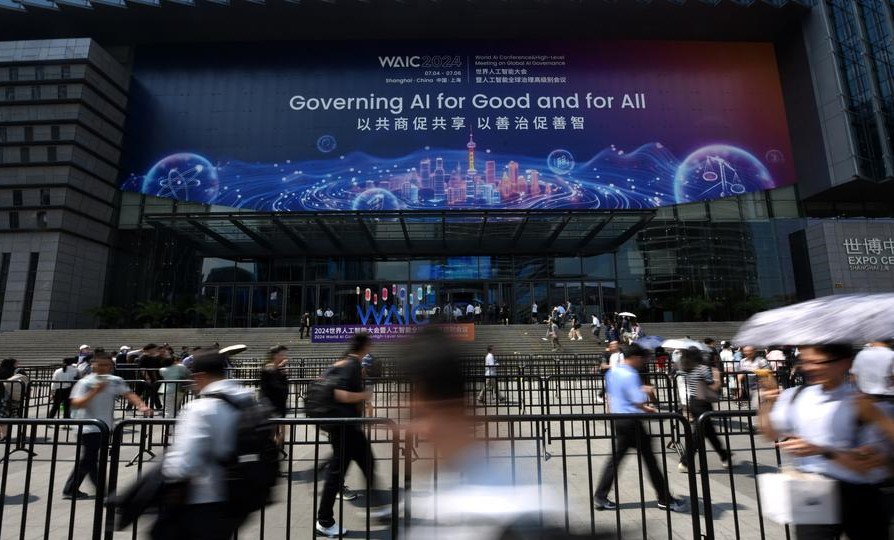SHANGHAI: In the vast wheat fields of Punjab province, tech-savvy farmers use their smartphones to apply fertilizers with pinpoint accuracy, while drones soar overhead to monitor the farmland. This AI-enabled approach to agriculture is facilitated by a solution developed by a joint lab between China and Pakistan.
The scenario exemplifies the typical instances of AI empowerment showcased at the ongoing World Artificial Intelligence Conference (WAIC). The three-day conference in Shanghai underscores the importance of fostering an inclusive approach to AI capacity building.
In recent years, China has worked to ensure the prowess of this transformative technology is accessible to all nations, significantly benefiting the Belt and Road Initiative (BRI) partner countries.
Muhammad Malik, a Pakistani farmer, initially had reservations about adopting AI in agriculture due to concerns about its complexity. The Chinese team addressed these concerns by developing a user-friendly guide in the local dialect and providing intuitive visual materials.
In addition, a group of Pakistani students have been invited to an AI institute located in the southern Chinese city of Guangzhou, where they will be trained to master the fundamentals of AI.
“Pakistan urgently needs to adopt advanced technologically-driven agriculture practices. This project represents a promising opportunity,” Sultan Habibullah Khan from the University of Agriculture, Faisalabad, was cited as saying in a case demonstration book.
Since China’s advocacy for the digital BRI, AI technology has increasingly played a pivotal role in bridging the digital divide among BRI countries.
SenseTime, a prominent Chinese AI software developer, collaborated with the Saudi firm Tahakom to inaugurate the kingdom’s first AI supercomputing center in 2023. This center, boasting a formidable computing power of over 5,000 teraflops, is instrumental in propelling Riyadh toward its vision of becoming a smart city.
The establishment has been a robust catalyst for nurturing AI innovation talent in Saudi Arabia, according to a manager at Tahakom.
In WAIC’s case show, a Yemeni runner named Al-Yaari made many new friends during the World Athletics Championships in Budapest, thanks to iFlytek’s AI-empowered translation device. This tool developed by the Chinese AI company enables real-time text and voice translation in 60 languages. “Its translation between Hungarian and Arabic is very accurate,” said Al-Yaari.
VOYATZOGLOU, Greece’s leading integrator of warehousing automation, has partnered with Megvii, a Chinese AI warehousing solution provider, to develop an advanced AI robot system. This year, they landed their first client — the Romanian slaughterhouse company Doly Com.
The smart warehouse, overseen by cutting edge four-way pallet robots, has achieved a remarkable increase in storage density or over three times the previous capacity. Additionally, it has relieved employees from the arduous task of working in extreme, freezing conditions.
AI capacity building extends to the cutting-edge of scientific research as well. The MeerKAT telescope in South Africa serves as a precursor to the Square Kilometer Array (SKA), which will become the world’s largest radio telescope array once completed.
Researchers from Guangzhou University and Pengcheng Laboratory are developing a near-real-time solution to handle the vast datasets generated by the MeerKAT telescope. They aim to harness China’s AI expertise to address challenges within the SKA project in the future.
In a declaration released at WAIC, China vowed to promote exchanges and cooperation on global AI research resources, establish cooperation platforms to facilitate technology transfer and commercialization, and promote fair distribution of AI infrastructure.
The 2024 WAIC, themed “Harnessing AI for the Common Good,” aims to explore the responsible and inclusive development of AI technologies.
The United Nations Industrial Development Organization has launched the Global Industry AI Alliance Excellence Center at the conference to narrow the digital divide among nations and to encourage the sharing of concepts and experiences, thereby fostering global collaboration in the realm of AI.


